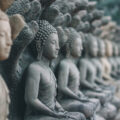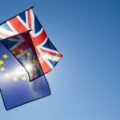How meditative traditions can revolutionise modern science
How meditative traditions can revolutionise modern science
Modern science has removed subjective experience from our picture of reality. Analyst Timo Pieters thinks the meditative traditions of our world religions could once again make it a valid subject of scientific study.
This weekly comment was written by Timo Pieters and reflects his personal analyses and opinions, rather than those of EARS.
The religious roots of modern, European science
When one looks at a list of the great scientists who launched the Scientific Revolution in the 16th century, one notices that they were all devout Christians.[1] Copernicus, Kepler, Descartes, Galileo, Newton, all of them. For example, more than half of Newton’s writing was about theology and alchemy, while only a third was about science and mathematics.[2] Galileo and Kepler were even practising astrologers.[3] In fact, up until roughly the 19th century, most scientists were religious, and predominantly Christian.[4] This raises the question of how their religious views influenced their scientific endeavours.
Why subjectivity was removed from modern science
If one reads the writings of these early pioneers, one discovers that their aim in doing science was to discover what reality looked like from God’s point of view. They wanted to know the mind of the creator by studying his creation. They consistently compared the natural world to the most advanced technology at the time, which was a mechanical clock. In their imagination, the clock must have had a clockmaker, so they wanted to know how he designed it. Since God was thought to be transcendent and absolute, his purely objective perspective could only be approached by removing any element of human subjectivity from their observations.[5]
One of the ways they tried to do this was by describing reality in mathematical terms, because mathematics was thought to be the language of God. Subjectivity was therefore intentionally removed from modern science. As a consequence, the role of mind or consciousness in nature was ignored for approximately three centuries, until the advent of psychology in the 19th century. Before then, the mind (or soul) was thought to be the domain of theologians and philosophers, so scientists kept their distance. It was only in the 20th century that the study of consciousness itself became a serious scientific pursuit.[6]
Why subjectivity is indispensable for a complete worldview
It seems rather straightforward that subjective experiences are part of what exists, and therefore need to be studied if one wants to understand the nature of reality. In fact, everything we care about is ultimately a subjective experience. All the different shades of suffering and wellbeing that sentient creatures can experience are by definition subjective phenomena, and therefore cannot be studied by the strictly objective methods of science. None of our experiences, whether sensory or mental, can be directly measured or observed by scientific instruments. We can only measure brain activity or ask people questions, but this does not measure the subjective experiences themselves.[7] How could our model of reality be complete if it does not include the things that we care most intimately about: consciousness and its contents?
The contemplative traditions that have studied subjective experience
Now, prior to the advent of modern science, human beings have investigated their own minds in various ways, and have kept records of their findings.[8] Today, we tend to classify such investigations under the umbrella of philosophy, spirituality, or religion. However, to avoid confusion, I prefer to call them contemplative traditions, because such traditions do not neatly fit into the boxes of ‘religion’, ‘philosophy’, or ‘science’. We find them in most of the world religions. For example, in Christianity we had the Desert Fathers, and great mystics like John of the Cross and Meister Eckhart. In Judaism we had the mysticism of the Kabbalah. In Islam, the Sufis were very active. In Hinduism, multiple traditions of meditation and yoga developed, as they have in Buddhism. The less familiar tradition of Daoism also produced many great contemplatives, such as Zhuangzi and Tao Hongjing.[9]
So, we have all these cultural resources for exploring and cultivating the human mind, but we seem to have abandoned them, because they are contaminated by religious dogma, or we extracted only parts of it, to serve our current needs. A perfect example of the latter is mindfulness meditation, which serves mostly to reduce stress, rather than as a tool for making empirical observations about the nature of the mind.
Introspection: investigating subjective experience
However, there are increasing numbers of scientists, philosophers, and contemplatives who are seeing the limitations of our current scientific paradigm, and who think that we need to start observing subjective phenomena with the same rigour and carefulness that we observe objective phenomena.[10] After all, how could we really understand the causes of suffering and wellbeing if we do not observe how they arise from a first-person point of view? To come to a complete understanding of reality, we could therefore combine first-person observations (introspection) with the third-person measurements of the existing sciences.[11]
One of the initiatives to begin this multidisciplinary collaboration is the Center for Contemplative Research (CCR) in Crestone, Colorado. Just as an astronomer needs a powerful telescope and extensive education to study external phenomena, a contemplative needs powerful concentration and philosophical training to accurately observe mental phenomena. The CCR is providing this training, and is setting up collaborations with neuroscientists, physicists, and psychologists to gain a more complete understanding of the human mind, and its role in nature.[12] This could well trigger a revolution in modern science by questioning the ideology of physicalism, which states that reality consists exclusively of physical phenomena. This conclusion is not the result of observations, but rather a philosophical assumption that has restricted our investigations unnecessarily.[13] [14] Let us question its validity by empirically observing what we are seeking to understand.
This weekly comment was written by Timo Pieters and reflects his personal analyses and opinions, rather than those of EARS.
Interested in similar topics? Go to our Dashboard and receive free updates.
[1] B. Alan Wallace, Minding Closely: The Four Applications of Mindfulness (Snow Lion Publications: 2011), p. 16.
[2] The Strange, Secret History of Isaac Newton’s Papers.
[3] Kepler’s Attitude Toward Pico and the Anti-Astrology Polemic, Galileo as Practising Astrologer, 2018.
[4] Wallace, Minding Closely, p. 16.
[5] Ibid.
[6] Ibid, p. 18.
[7] Ibid, p. 24.
[8] These records can be found in the various religious canons. The examples are numerous. In Hinduism, you have the Upanishads. In Buddhism, you have the writings of great yogis like Milarepa and Dudjom Lingpa. In Daoism, you have the experiments of hermits like Tao Hongjing.
[10] Scientific Advisory Board.
[11] What is Contemplative Science?
[12] Ibid.
[13] Leopold Stubenberg, “Austria vs. Australia: Two Versions of the Identity Theory,” in Austrian Philosophy: Past and Present, ed. K. Lehrer, et al. (Dordrecht: Kluwer, 1997), 125–146.
[14] Thomas W. Polger & Lawrence A. Shapiro, The Multiple Realization Book, Oxford: Oxford University Press, 2016.






